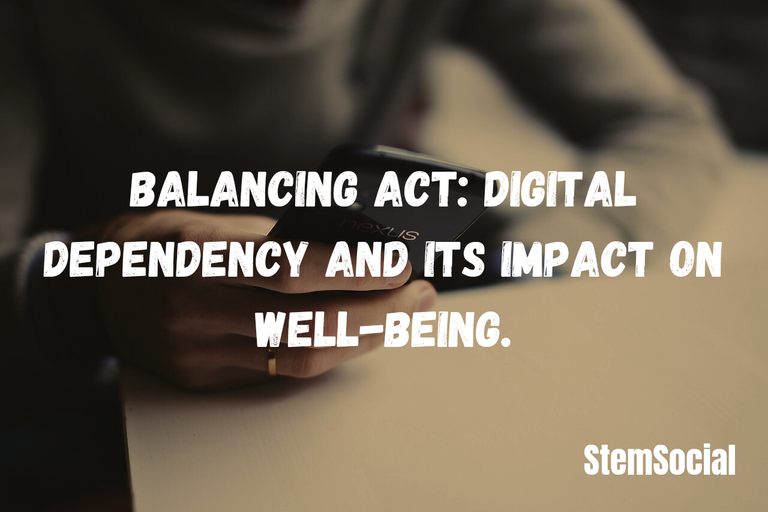Balancing Act: Digital Dependency and Its Impact on Well-being.
In our modern, fast-paced society, digital devices are everywhere, and this widespread use has brought about a significant concern: our excessive reliance on screens. Just as consuming unhealthy food can negatively impact our physical health, spending an excessive amount of time on screens can have adverse effects on our mental and emotional well-being. In this discussion, we will talk about this issue by sharing a real-life example to help us better understand it and provide some guidance on how to establish a healthier balance in our use of digital technology since it's part of our daily lives now.

This image was sourced and editted with canvas
The Story of Daniel: A Compelling Wake-Up Call on Digital Dependency
Allow me to introduce you to Daniel, a 30-year-old graphic designer residing in a vibrant urban city. Daniel's typical day centers around his smartphone, which he uses to check emails, immerse himself in social media, and enjoy long binge-watching sessions of his favorite TV programs. His connection to digital screens is so constant that even his daily commute still offers no escape. On weekends, he dedicates a significant portion of his time to streaming numerous online videos on TikTok. As a result of this relentless digital engagement, Daniel's screen time has reached concerning levels, and the negative effects are becoming more noticeable in his daily life.

The Implications of Excessive Digital Engagement
According to scientific research, the over dependence on digital screens, as seen in Daniel's case, can result in a range of troubling consequences:
1. Sleep Problems:
Spending too much time on screens, especially late into the night, messes up your natural sleep patterns. This leads to constant tiredness and lower productivity during the day.
2. Feeling Alone:
When you prioritize online interactions over face-to-face ones, you can end up feeling very lonely, missing out on genuine social connections.
3. Work Troubles:
Constant notifications and distractions from digital devices can make it really hard for you to focus on your job. This can even threaten your career progress.
4. Mental Health Issues:
Getting deeply involved in social media can expose you to harmful comparisons and negativity. This often leads to higher anxiety levels and deeper feelings of sadness.
Strategies for a Healthy Digital Routine
1. Defining Clear Guidelines:
To kickstart a balanced digital lifestyle, it's important to establish straightforward rules governing the use of digital devices. This should include allocating specific periods for screen-free activities, particularly during meals and before bedtime.
2. Prioritizing Real-Life Connections:
Embrace a strong commitment to spending meaningful moments engaging with people in person. This proactive approach can help counter feelings of social isolation and loneliness.
3. Thoughtful Engagement Online:
Exercise discretion in your online interactions and content consumption. For instance, in Daniel's case, he can ensure his online environment is filled with positive and inspiring content while actively avoiding harmful news and negativity.
4. Regular Screen Breaks:
Integrate periodic breaks from digital screens into your daily routine. Utilize this time to explore personal hobbies, engage in physical exercises, or simply immerse yourself in the natural world around you.
In Conclusion
Daniel's experience shows how too much digital time can lead to serious problems. It can mess up your sleep, strain your relationships, hurt your work, and even affect your mental health. But there are ways to fix this. By setting limits, spending more time with real friends, being careful about what you do online, taking regular breaks from screens, and asking for help when needed, you can get back in control. Technology should make life better, not take it over. With some effort, you can find a balance between the digital and real world.
Written with love and Care,
Willy.
Thanks for your contribution to the STEMsocial community. Feel free to join us on discord to get to know the rest of us!
Please consider delegating to the @stemsocial account (85% of the curation rewards are returned).
Thanks for including @stemsocial as a beneficiary, which gives you stronger support.